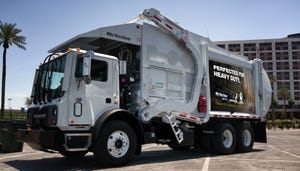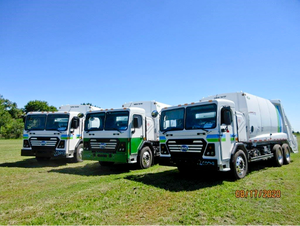California Nears Law Requiring Organic Waste Infrastructure Planning
California’s assembly has passed a bill requiring local governments to plan for the building of sufficient composting infrastructure to process organic waste.
The California Senate passed AB 876, authored by Assembly member Kevin McCarty (D-Sacramento), which would force local governments, beginning Aug. 1, 2017, to assess the amount of organic waste that will be generated in a region during a 15-year period. They would be required to identify locations for new or expanded organic waste recycling facilities capable of handling this material, according to a news release from the Sacramento-based environmental advocacy group, Californians Against Waste.
The bill now goes to Gov. Jerry Brown to decide whether or not to sign it into law.
California has long required local governments to plan for 15 years of disposal capacity to avoid running out of landfill space. With progress taking place in the state in diverting organic waste from landfills, the bill addresses a growing need to plan for the necessary composting and anaerobic digestion facilities to meet that growth, the group said.
“It is clear that we have much better uses for our food scraps and yard trimmings than to let them rot in landfills and contribute to climate change,” said Nick Lapis, legislative coordinator for Californians Against Waste. “AB 876 moves the state one step closer to healthier soils and a healthier climate.”
Nearly two-thirds of the material that Californians send to landfills is plant-based, and nearly half is compostable or digestible, the group said. California has a state goal of recycling 75 percent of its waste by 2020.
California’s Air Resources Board has set a goal of "effectively eliminating disposal of organic waste at landfills" by 2025 to prevent landfill methane emissions.
California passed legislation last year requiring businesses to separate their organic waste, and for local governments to find new uses for yard trimmings that had been previously sent to landfills.
Food waste continues to get major attention from governments looking to increase diversion. The Florida city of Orlando is expanding its commercial food waste collection program, previously a pilot, to all area businesses.
“We began offering the program because we have a goal of 50-percent waste diversion by 2018, and zero waste by 2040,” says Ian Jurgensen, sustainability project manager for the city, in a recent interview with Waste360 about the program.
Meanwhile, California is reportedly struggling to reach its recycling goal. Since the recycling goal was announced, California’s source reduction, recycling and composting rates haven’t improved from 50 percent.
About the Author(s)
You May Also Like


